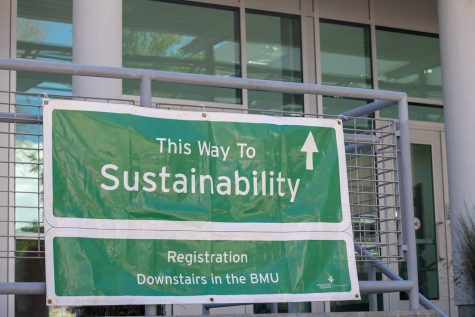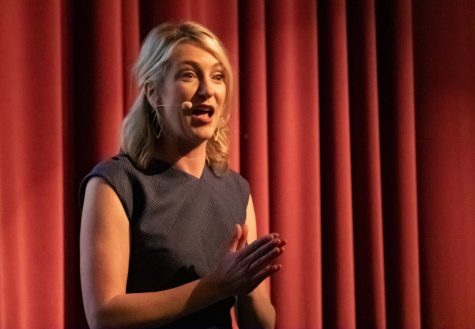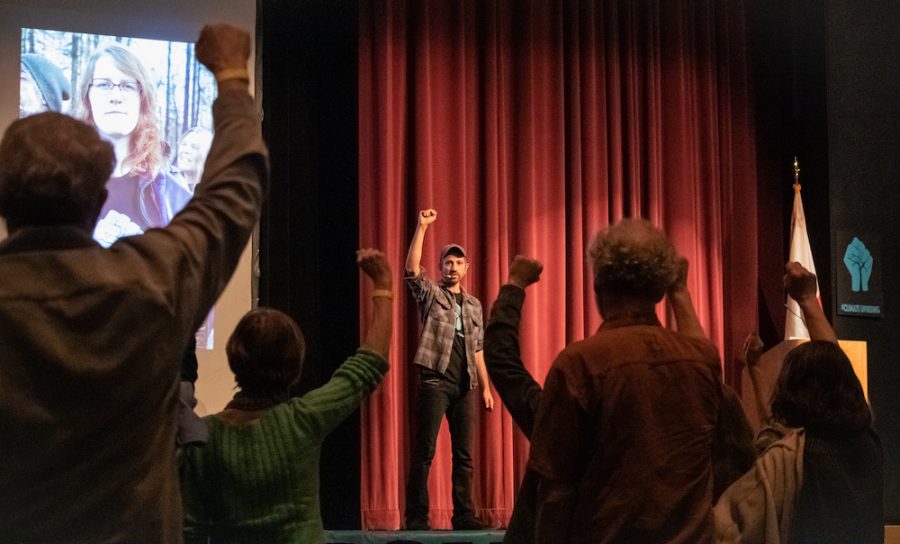“This Way to Sustainability” was held Thursday and Friday, highlighting Chico State’s green initiative on campus. The nationally recognized, student-run conference helped to spread information about climate change, ways to limit greenhouse gas emissions, reduce waste, and create a more sustainable lifestyle for community members.
The conference started at 8 a.m. on Thursday with a free breakfast for students and attendees, then broke out into small group sessions where students talked about specific climate change issues most relevant to them.
Throughout the first day, there were two keynote speakers, Thomas Goreau and Wenonah Hauter. Goreau is a biochemist from MIT, Caltech and Harvard who talked about his work in restoring ecosystems specifically in tropical climates. In his speech, he emphasized the need for a more radical, quick fix to save marine life and coral systems. He also urged students to research ways they could incorporate plants into their sustainable lifestyle.
Hauter is the founder and executive director for Food and Water Watch, a nongovernmental organization. She is also an activist and author of “Frackology: The Battle for the Future of Energy and the Environment.” Her speech focused more on the sustainability of food, touching on water, agriculture and ways farmers can be more sustainable in their practices.

In between breakout sessions and keynote speakers, free lunch was provided for attendees and students. All food and utensils were sustainable and fair-trade. Organic coffee and tea were included.
More sessions took place Friday. Alice Julier, the director of food studies at Chatham University, discussed her research on regenerative agriculture Friday afternoon in the BMU.
“We train people to be engaged and knowledgeable professionals with transformative and ethical food systems,” Julier said. “I’ve been working for so long on sustainability and student agriculture, but I feel like I still have so much to learn about regenerative agriculture.”
Julier went on to speak about how many different ways we can work as a group to improve agricultural practices that regenerate the environment. She also spoke about how different agriculture is in different parts of the country and how some areas are more heavily involved in improving practices.
“I think a lot about how regions deal with promoting sustainability, with being sustainable,” Julier said. “It’s important to look at both what we have in common and look at what is unique and special and different.”
The final presentation on Friday focused on the immediate need for action against climate change.
Los Angeles filmmaker Nirvan Mullick spoke on how he created the movement #ClimateUprising, a bipartisan call for action on the worsening state of Earth’s climate. His directing helped bring support to the Earth to Paris movement in 2015 in which countries around the world agreed to tackle climate change, a movement the United States abstained from.
Mullick discussed his current project which focused on the Camp Fire as the last straw in ignoring climate change and urged the audience to become involved to make a change now.
“We are the first generation to experience the effects of climate change and the last with a chance to do something about it,” Mullick said.

Audrey Denney, a Democratic candidate for California’s first congressional district, ended the conference with a couple of ideas to become more sustainable as a community. Denney spotlighted some of the community leaders who are pushing for a more sustainable future, such as Vice Mayor Alex Brown and Associated Students Vice President Jared Geiser.
Denney then called for the audience to make a change by supporting these leaders. Audience members rose from their seats in a standing ovation to show their support for the efforts in combating climate change.
Kendall George, Nate Rettinger and Gordy Papalias can be reached at newseditor@theorion.com or @theorion_news on Twitter





